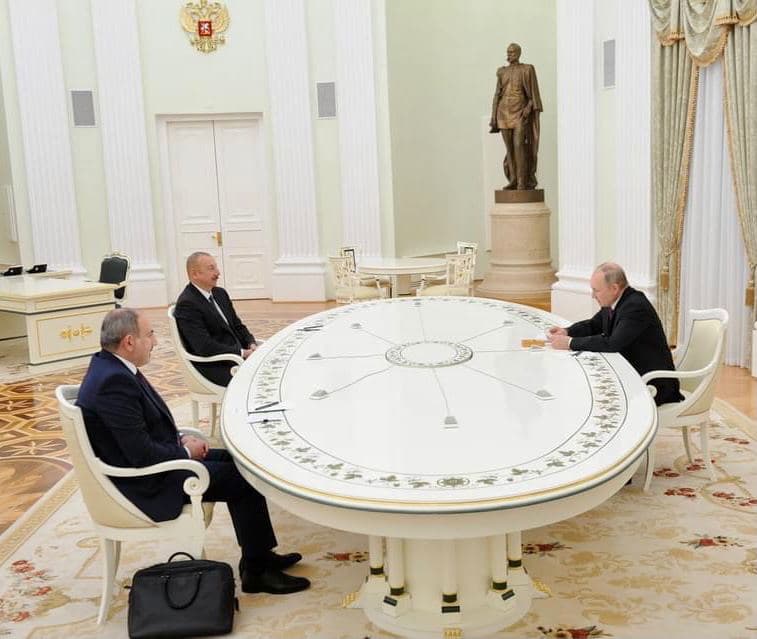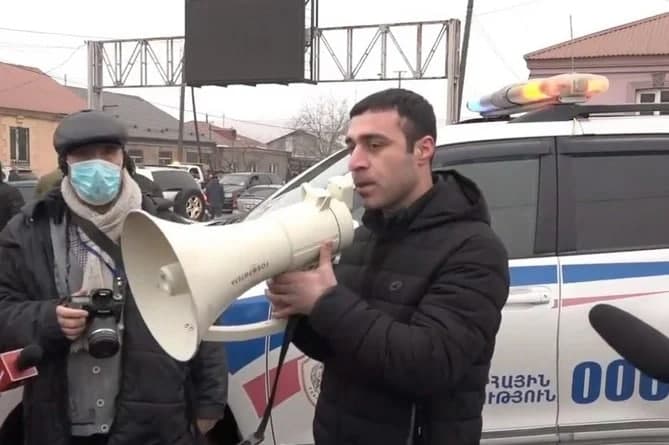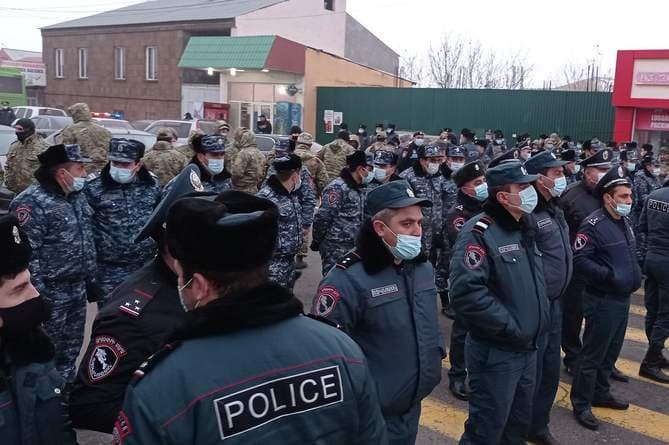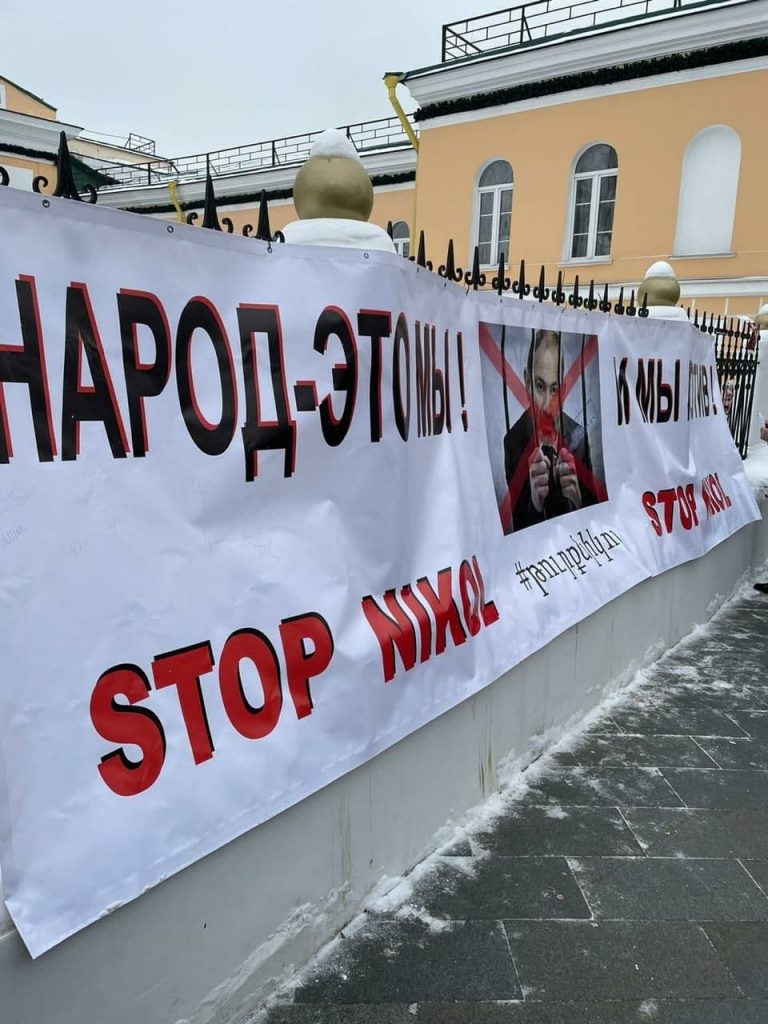Armenian, Azerbaijani leaders hold 1st meeting since end of war, agree on transport links
The main result of the meeting in Moscow on January 11 of the leaders of Azerbaijan and Armenia on the initiative of the President of Russia is the creation of a joint working group, which should present plans for the development of Nagorno-Karabakh in the near future.
The development of end-to-end railway and road communication through the territories of Armenia and Azerbaijan was named as a priority.
The working group will be headed by the vice-premiers of the three countries, the first meeting should take place before January 30.
This was stated in a joint statement of the three leaders. Also, Russian President Vladimir Putin, Azerbaijani President Ilham Aliyev and Armenian Prime Minister Nikol Pashinyan made press statements.
Azerbaijani President Ilham Aliyev expressed satisfaction with the talks, but Armenian President Nikol Pashinyan stated that many unresolved issues remain.
He named the most important of them as the status of Nagorno-Karabakh and the problem of the release and return of prisoners of war to their homeland.
- Why there are so many problems with the Armenia-Azerbaijan ‘new-old border’
- Terms of the Karabakh truce – corridors, boundaries and peacekeepers
- Op-ed: why Azerbaijan needs the deployment of Turkish troops in Karabakh
- Op-ed: ‘Blood, toil, tears and sweat’ – solving the Armenian political crisis
Joint statement text
The negotiations took place behind closed doors and lasted three hours and 45 minutes. This was the first face-to-face meeting of the leaders of Azerbaijan and Armenia since the end of the second Karabakh war (September 27 – November 10, 2020).

The text of the joint statement of the leaders of the three countries:
“The working group will hold the first meeting until January 30, 2021, based on the results of which it will form a list of the main areas of work arising from the implementation of paragraph nine of the Statement, setting railway and road communications as priorities, and will also determine other areas as agreed between the Republic of Azerbaijan, the Republic of Armenia and RF.
In order to implement the main directions of activity, the co-chairs of the working group will approve the composition of expert subgroups in these areas from among the officials of the competent authorities and organizations of the parties. The expert subgroups, within a month after the meeting of the working group, will present a list of projects with justification of the necessary resources and measures for their implementation and approval at the highest level by the parties.
By March 1, 2021, the working group will submit for approval at the highest level by the parties a list and schedule for the implementation of measures involving the restoration and construction of new transport infrastructure facilities necessary for the organization, implementation and security of international transport through the Republic of Azerbaijan and the Republic of Armenia, as well as and transportations carried out by the Republic of Azerbaijan and the Republic of Armenia, which require crossing the territories of the Republic of Azerbaijan and the Republic of Armenia”.
Putin is pleased with Russian peacekeepers in Karabakh and talks about new prospects for the development of the South Caucasus
Putin said that the region as a whole respects the conditions of the trilateral statement, which was signed on November 10, 2020, and stopped hostilities in Karabakh and adjacent regions.
“There have been no serious incidents. The Russian peacekeeping group fully fulfills its obligations to both sides. Over 48 thousand displaced persons and refugees have already returned to Nagorno-Karabakh. Work is underway to improve infrastructure, ”said Vladimir Putin.
He called the meeting held “extremely important and useful”. “The development of the transport infrastructure and economy of the region will benefit both the Armenian and Azerbaijani peoples and the region as a whole, and therefore [corresponds] to the interests of the Russian Federation,” Putin said.
Aliyev: "Most of the points of the agreement of November 10 have been fulfilled, the opening of transport communications will strengthen security in the region"
“Today’s meeting shows that we are committed to results. Most of the points of the statement of November 10, 2020 have been completed. One of them was the unblocking of transport links. This can give great dynamism to the development of the region.
Also, the opening of transport communications will strengthen security in the region, as it meets the interests of the peoples of Azerbaijan, Armenia, Russia and our neighbors,” said Azerbaijani President Ilham Aliyev.
He said that the Russian peacekeeping mission is doing its job effectively and “in the past two months, with the exception of minor incidents, there have been no major causes for concern.”
Pashinyan: "The Nagorno-Karabakh conflict has not yet been resolved"
At a joint briefing after the talks, the Armenian Prime Minister thanked the Russian President for his efforts to “restore stability and security” in the region.
However, then Nikol Pashinyan said that the Nagorno-Karabakh conflict “has not yet been resolved.”
“We managed to secure the ceasefire, but there are still many issues that must be resolved. One of these issues is the issue of the status of Nagorno-Karabakh. Armenia is ready to continue negotiations within the framework of the OSCE Minsk Group co-chairmanship,” Pashinyan said.
He called the exchange of prisoners of war the most important for Armenia.
“This was stipulated by paragraph eight of the joint statement of November 10, but, unfortunately, it has not been fully implemented.
This is the most sensitive and painful issue, and we agreed that we will continue to work in this direction. I hope that we will be able to come to a concrete decision as soon as possible.”
Pashinyan called the agreement reached on the creation of a joint working group and the opening of transport communications “very important”.
“The implementation of the agreements can change the economic image of our region. Economic innovations can also lead to more reliable security guarantees. And we are ready to work constructively in this direction,” Pashinyan said.
Opposition threatens not to let the prime minister back into Armenia – how Pashinyan was "escorted" to a meeting in Moscow
Starting in the early morning of January 11, when the prime minister had not yet flown to Moscow, representatives of the opposition parties blocked the road leading to the Zvartnots international airport in Yerevan.
Thus, the opposition tried to prevent Nikol Pashinyan from flying to Moscow. As a result, additional police forces were pulled up to the road to the airport.


The protesters shouted slogans such as “Nikol is a traitor”, “Nikol, go away”. The united opposition parties, which since the end of the war have been demanding the resignation of the prime minister, reiterated that Pashinyan does not represent Armenia and Nagorno-Karabakh, and he does not have an appropriate mandate to make decisions.
One of the protesters “warned” the prime minister: if he signs any documents unfavorable for the country in Moscow, then “the airspace of Armenia will be closed for him forever.”
How exactly the opposition is going to close the airspace and prevent the return of the prime minister to Armenia was not mentioned.
Protest at the Armenian Embassy in Russia, photo
Several dozen people gathered in front of the Armenian Embassy in Russia even before the start of the trilateral negotiations. More than a dozen police officers cordoned off the embassy building.
Participants of the action installed a large poster here with the words “We are the people. And we are against you”,“Turk Nikol”,“Stop Nikol”.
Then, at the request of the security service of the Armenian Embassy, the protesters removed the poster with the inscription “Turk Nikol”.

The Armenians gathered at the embassy opposed Nikol Pashinyan’s visit to Moscow and the signing of any document on behalf of the Armenian people.
The protesters demanded that the prime minister listen to the demand of the people, the president of Armenia, parliamentary and extra-parliamentary parties, and many representatives of the intelligentsia – and resign. This is stated in the petition, which they signed right in the courtyard of the embassy.
“We believe that a decent commander-in-chief, a leader of the country who lost the war, if he were a patriot and thought about the Armenian people, should voluntarily resign,” said Levon Mukanyan, vice president of the All-Russian public organization Union of Armenians of Russia.


















